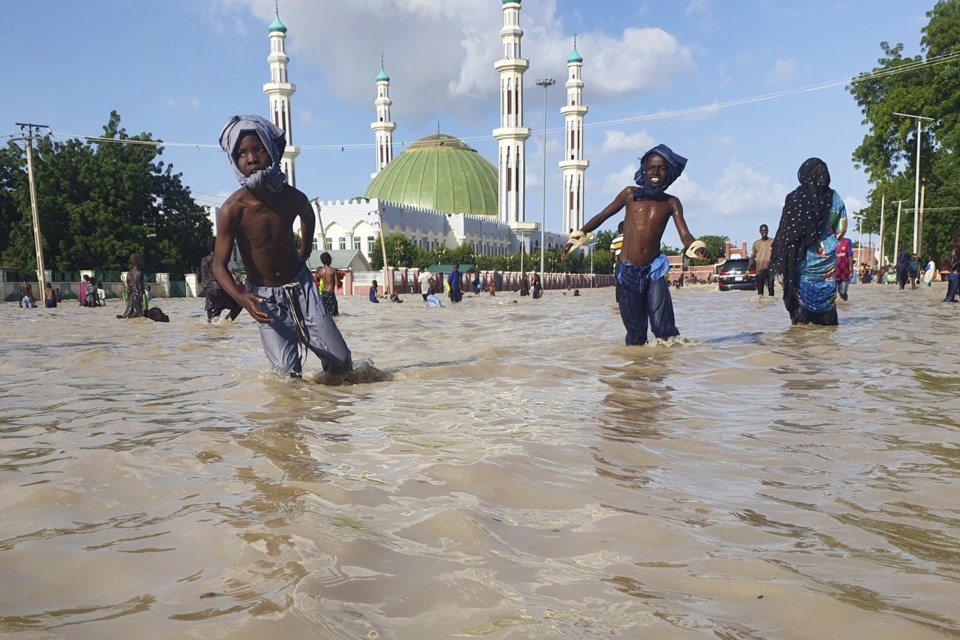ABUJA, Nigeria (AP) — Houses swept away to the very last brick. Inmates frantically fleeing the city's main prison as its walls got washed away by water rising from an overflowing dam. Corpses of crocodiles and snakes floating among human bodies on what used to be main streets.
As torrential rains across Central and West Africa have unleashed the most , residents of Maiduguri, the capital of the fragile Nigerian state of Borno — which has been at the center of an — said they have seen it all.
The floods, which have killed more than 1,000 people and displaced hundreds of thousands across the region this year, have worsened existing humanitarian crises in the countries which have been impacted the most: Chad, Nigeria, Mali and Niger. Over four million people have been affected by flooding so far this year in West Africa, a threefold increase from last year, according to the U.N.
With rescue operations still underway, it is impossible to give an accurate count of lives lost in the water. So far, at least 230 were reported dead in Nigeria, 265 in Niger, 487 in Chad and 55 in Mali, which has seen the most catastrophic flooding since the 1960s.
While Africa is responsible for a small fraction of global greenhouse gas emissions, it is among the most vulnerable to , the World Meteorological Organization said earlier this month. In sub-Saharan Africa, the cost of adapting to extreme weather events is estimated between $30-50 billion annually over the next decade, the report said. It warned that up to 118 million Africans could be impacted by extreme weather by 2030.
Maiduguri, the capital of Borno state, has been under significant strain. Over the last decade, Borno has been hit by a , who want to install an Islamic state in Nigeria and have killed more than 35,000 people in the last decade.
Saleh Bukar, a 28-year-old from Maiduguri, said he was woken up last week around midnight by his neighbors.
"Water is flooding everywhere!" he recalled their frantic screams in a phone interview. “They were shouting: ’Everybody come out, everybody come out!” Older people and people with disabilities did not know what was going on, he said, and some were left behind. Those who did not wake up on time drowned right away.
Local authorities are overwhelmed by the scale of the disaster: over 400,000 people in Nigeria have been displaced, and at least 240 people were killed.
Last week, floods killed about 80% of the animals at the Borno State Museum Park and an unspecified number of reptiles escaped. The city's main prison was so damaged that hundreds of inmates escaped. The waters knocked down the walls of the local police station and some of the government's offices.
The World Food Program has set up kitchens providing food to the displaced in Maiduguri as well as emergency food and cash assistance to people in the most hard-hit areas. USAID said Wednesday it has provided more than $3 million in humanitarian assistance to West and Central Africa, including $1 million provided in the immediate aftermath of the floods.
But many say they were left to fend for themselves.
Floods in mostly arid Niger have impacted over 841,000 people, killing hundreds and displacing more than 400,000.
Harira Adamou, a 50-year-old single mother of six, is one of them. She said the floods destroyed her mud hut in the northern city of Agadez.
“The rooms are destroyed; the walls fell down," she said. “It's a big risk to live in a mud hut but we don’t have the means to build concrete ones.”
Adamou, who is unemployed and lost her husband four years ago, said she has not received any support from the state and has not had the opportunity — or the means — to relocate. She and her children are living in a temporary shelter next to their shattered hut, and fret that the torrential rains might return.
“I understood there was a change in the weather,” she said. “I have never seen a big rain like this year here in Agadez.”
In Maiduguri, 15% of the city remains underwater, according to local authorities. As forecasts predicted more rains across the region, Nigerian authorities warned earlier this week that more floods are expected.
Bukar said he kept going back to see whether the water that swallowed his home had receded, but that has not happened. He said he has not received any aid from authorities except for some food items handed out at the local school, where he is sheltering with 5,000 others.
He is trying to stay sane by helping others. Along with his friend, he helped recover 10 bodies and rescued 25 people, rowing down the streets in a canoe. He said he's also helping out cooking meals for those that are sheltering with him.
"I am volunteering to help, but I am also a victim,” he said. “Our people need us. They need help.”
___
Pronczuk reported from Dakar, Senegal.
Dyepkazah Shibayan And Monika Pronczuk, The Associated Press




